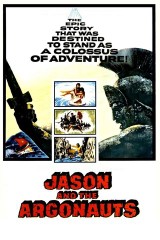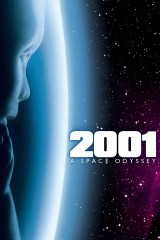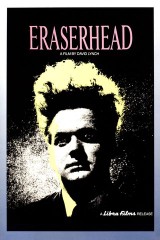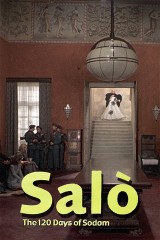TAGGED AS: Interview

Getty Images / Nicholas Hunt
Gaspar Noe is known for making provocative films, but he says it’s not particularly easy to be provocative anymore, since nothing can top the outrageous and exciting themes of some of the films he grew up with. With his new film, Love, now open, and others like Enter the Void, 7 Days in Havana, and Irréversible in his filmography, Noe has certainly pushed envelopes of all sizes. But now he tells us which movies pushed his envelopes and, essentially, changed his life.

Jason and the Argonauts is the very first movie that I ever remember watching. My parents were living in New York and I was a very young kid. And I remember being in front of my TV all alone watching skeletons fighting with swords. For me it was magic. I guess the emotion was so strong that the memory of the room and the TV still piques my mind because maybe at that age you don’t really know what a skeleton is. But watching skeletons fighting was like, “Wooh-wooh, what the f— is this?” And I have a memory of that movie that sticks in my mind of the giant — there’s a boat that goes through the legs of a big giant. I have a lot of respect for those movies, like the old King Kong, which create a grand world with the tricks. I’ve always been respectful to all the people who do visual effects and special effects, because making movies is also making magic. You can also admire a man who pretends to cut a woman to pieces in a theater because he makes these images of horror that, again, don’t hurt. That was my very first memory of this film. And I was always going to see movies since then.

When I was seven, my parents were living again in Buenos Aires, and they were going to watch movies all the time. Maybe that day they could not leave me at home because there was no one to take care of me, so I remember we went with my sister and my parents to see 2001. And we were on the first row of the balcony, so we were in front of the movie. And the monkey in front of the monolith, the tunnel of light at the end of the movie, the fetus floating at the end of the movie — all that happening in front of my eyes was, for me, like my very first drug experience — or transcendental experience — ever. I was blown away by the images. And maybe it’s a fake memory that I have, but I remember — during the movie, at that very early age — it seems to me that I liked it much more than my parents, because even then, when I talked about it with my parents, they didn’t really care much about 2001.
And for me it became like an obsession. Every summer, or every two summers, the movie was replaying in some theater in Buenos Aires. And I would go again and again and again to watch it. Also because, for me, it was the ultimate image of what the future world could become. And I thought that when I would be maybe 30-40 I would really be living in a world in which it would be easy to go to the moon or do things like that. And to this day when I rewatch that movie, I feel it’s still representing the future in a very accurate way. Besides that, the dresses are very pop art. Since then I’ve seen it like 40, 60 times and I never ever get tired of replaying it. And sometimes even for New Year’s Eve, instead of going out partying, I want to start the year in a good mood so I just stay and put the movie on my DVD player. I know that that movie also — because it’s very tricky — I would say later in my life when I was a teenager doing mushrooms or taking acid, mostly it’s because I wanted to have the same impact in my brain that that movie had when I was a kid. And you can clearly tell that Enter the Void — it’s not an homage, but it’s a movie extremely inspired by 2001. And since then, I collect every single poster of that movie, every single lobby card. I have an obsession. I want to possess that movie, which is totally unpossessable.

When Eraserhead came out in France, it came out with the weird title, The Head to Erase. It was in French. I remember I was reading my parents’ newspaper — it was a socialist newspaper — and there was a whole page of how much this famous film critic didn’t like the movie. He was really trashing the movie. But the way he was saying it was very awful, disgusting, it made me — I was a 14 or 15 year old kid — want to go to the other side of the city and see it. And then it was like my own secret. And I went there. And I loved the movie so much, that I believe I went to see it four times in one month. Then after two weeks it moved to another city and I went to see it again in a screening with my friend. Then maybe one year later, it was replaying near my house at the midnight screening, so I went again with another friend. And for me that was the confirmation that cinema could also portray your inner world, that cinema could portray dreams and nightmares. And I hadn’t seen, at that time Un Chien Andalou by [Luis] Buñuel but Un Chien Andalou is one of the rare movies that is written in a mental language, a dreamt language. Eraserhead is another one. Kubrick said once that he regrets he didn’t have the idea to do that movie. In any case, it had such a strong impact on me that I would say Eraserhead — it made me get into film school two years later. Maybe it was a mix of 2001 and Eraserhead.
I don’t know how many times I saw Eraserhead in the movie theater, but I guess it was maybe 15 times. I had an addiction to this movie, which is the kind of addiction kids can have to their mother telling them a story. You want to listen to the same story over and over, and have a hypnotic feeling and relaxing feeling. It created some kind of relaxing feeling in me. That I would enjoy all these movies — that are nightmarish– as if it were a dream, especially when the girl comes out saying everything is fine in heaven. There’s a fact also that David Lynch made that movie with almost no money over a period of five years. Then when I was doing I Stand Alone, I had a lot of money issues. I had problems completing the movie, then doing the editing, also. All the time I had in mind that David Lynch did that movie in five years. And I said well, “Maybe it will take me 10 years to finish the movie. If it takes ten years I’ll do it and I shouldn’t worry.”

Then I got into film school at the age of 17. Because I was young, the day I turned 18 my mother wanted me to see [Pier Paolo] Pasolini’s Salò. She said now you are old enough to see a precise portrayal of human cruelty. Maybe because my parents escaped Argentina during the dictatorship to avoid ending up in a torture camp like their friends ended up, she had a particular concern about the portrayal of human cruelty and torture. So she said, “You want to know how bad life can turn? Come with me and see this film.” And I saw it. And I know that movie stuck to my mind for, like, 12 years in a very precise, shocking way. And I never felt, for 12 years, the need to re-watch it. I said it was great to see it, but I was not ready to admit the perception of how bad people can be. It’s those very hot and cold — how do you say the people who study insects? -– entomologists. Sometimes you feel almost like an entomologist describing the life of ants. But the vision is sharp. The lesson is sharp. And also what I like about the movie is that, although the movie is about masters and victims, Pasolini — he’s not on the side of any. He’s just — like a dark situation, sharing the pain of one, or the dark joy, or the dirty joy, I don’t know. It’s almost like they’re above the character that they’re describing and they don’t identify with any particular one. You can also have that in The Battle of Algiers. But in any case, at 18, that’s a very major movie. I think nowadays that’s one of the very major movies in the future of cinema. It’s something strong that has not been copied in any way since. And that’s why, in my movie, I wanted to put Pasolini’s Salò poster above the bed, just to remind me that whatever I will do, my movie cannot shock, because of some people before us who made these extremely daring movies that really shocked their time. When people tell me I’m provocative I know that I’m not at all, compared to these masters of cinema.

Maybe ten years later [after seeing Salò], I had written some shorts and I was talking with a friend who said, “Oh, have you seen this Austrian movie that has been banned in France for extreme violence?” That came out in VHS. And the German title was Angst. And the VHS was called Schizophrenia — the French VHS with French subtitles. And I tell you it was weird, it was like the beginning of some kind of new thing — that some movies could be banned for theatrical release but they could still come out on VHS. So I got the VHS. Nowadays there are maybe things that are banned out there, but you can find it with one click on the net. But this time, something that was banned could be found on VHS. I bought that VHS; that was quite hard to find. And I believe that I watched that movie 50 times because each time a friend said, “Let’s go see a movie,” I said, “Come to my house. I’ll show you Schizophrenia.” So one by one I was showing that movie to all my friends.
And it’s got the most amazing camera work in the history of cinema. Not so many movies that really impress when it comes to the camera work. Maybe Brian DePalma’s movies… or 2001. Or, for example, lately, the images of Gravity. But the camera work of this movie is so real. It added to a very violent story of the guy coming out of jail and killing a whole family in order to go back to jail where he felt better, and it’s based on a true story. And it’s got a [unique] voiceover. But the mix of that cruelty, the voiceover and the camera put in positions that you’ve never seen before made me be obsessed with the movie. Now, since three or four months ago, it’s for sale [on DVD here in America]. So if anybody is interested you can go on Amazon.com and buy that movie called Angst.
Love is now open in limited release.